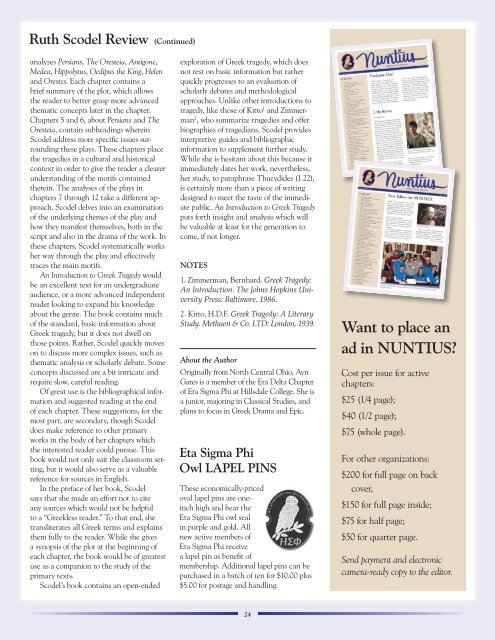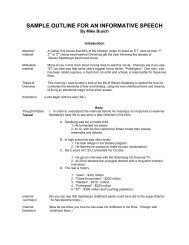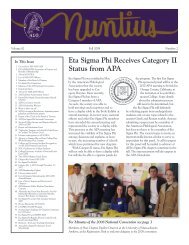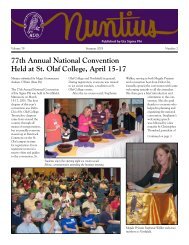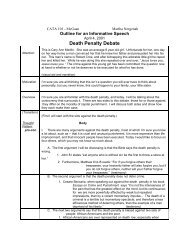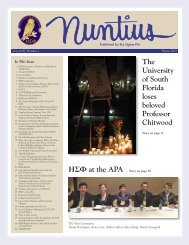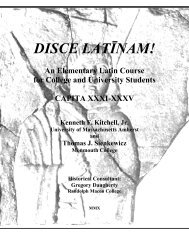In the Land of the Sibyl - Monmouth College
In the Land of the Sibyl - Monmouth College
In the Land of the Sibyl - Monmouth College
Create successful ePaper yourself
Turn your PDF publications into a flip-book with our unique Google optimized e-Paper software.
Ruth Scodel Review (Continued)<br />
analyzes Persians, The Oresteia, Antigone,<br />
Medea, Hippolytus, Oedipus <strong>the</strong> King, Helen<br />
and Orestes. Each chapter contains a<br />
brief summary <strong>of</strong> <strong>the</strong> plot, which allows<br />
<strong>the</strong> reader to better grasp more advanced<br />
<strong>the</strong>matic concepts later in <strong>the</strong> chapter.<br />
Chapters 5 and 6, about Persians and The<br />
Oresteia, contain subheadings wherein<br />
Scodel address more specific issues surrounding<br />
<strong>the</strong>se plays. These chapters place<br />
<strong>the</strong> tragedies in a cultural and historical<br />
context in order to give <strong>the</strong> reader a clearer<br />
understanding <strong>of</strong> <strong>the</strong> motifs contained<br />
<strong>the</strong>rein. The analyses <strong>of</strong> <strong>the</strong> plays in<br />
chapters 7 through 12 take a different approach.<br />
Scodel delves into an examination<br />
<strong>of</strong> <strong>the</strong> underlying <strong>the</strong>mes <strong>of</strong> <strong>the</strong> play and<br />
how <strong>the</strong>y manifest <strong>the</strong>mselves, both in <strong>the</strong><br />
script and also in <strong>the</strong> drama <strong>of</strong> <strong>the</strong> work. <strong>In</strong><br />
<strong>the</strong>se chapters, Scodel systematically works<br />
her way through <strong>the</strong> play and effectively<br />
traces <strong>the</strong> main motifs.<br />
An <strong>In</strong>troduction to Greek Tragedy would<br />
be an excellent text for an undergraduate<br />
audience, or a more advanced independent<br />
reader looking to expand his knowledge<br />
about <strong>the</strong> genre. The book contains much<br />
<strong>of</strong> <strong>the</strong> standard, basic information about<br />
Greek tragedy, but it does not dwell on<br />
those points. Ra<strong>the</strong>r, Scodel quickly moves<br />
on to discuss more complex issues, such as<br />
<strong>the</strong>matic analysis or scholarly debate. Some<br />
concepts discussed are a bit intricate and<br />
require slow, careful reading.<br />
Of great use is <strong>the</strong> bibliographical information<br />
and suggested reading at <strong>the</strong> end<br />
<strong>of</strong> each chapter. These suggestions, for <strong>the</strong><br />
most part, are secondary, though Scodel<br />
does make reference to o<strong>the</strong>r primary<br />
works in <strong>the</strong> body <strong>of</strong> her chapters which<br />
<strong>the</strong> interested reader could pursue. This<br />
book would not only suit <strong>the</strong> classroom setting,<br />
but it would also serve as a valuable<br />
reference for sources in English.<br />
<strong>In</strong> <strong>the</strong> preface <strong>of</strong> her book, Scodel<br />
says that she made an effort not to cite<br />
any sources which would not be helpful<br />
to a “Greekless reader.” To that end, she<br />
transliterates all Greek terms and explains<br />
<strong>the</strong>m fully to <strong>the</strong> reader. While she gives<br />
a synopsis <strong>of</strong> <strong>the</strong> plot at <strong>the</strong> beginning <strong>of</strong><br />
each chapter, <strong>the</strong> book would be <strong>of</strong> greatest<br />
use as a companion to <strong>the</strong> study <strong>of</strong> <strong>the</strong><br />
primary texts.<br />
Scodel’s book contains an open-ended<br />
exploration <strong>of</strong> Greek tragedy, which does<br />
not rest on basic information but ra<strong>the</strong>r<br />
quickly progresses to an evaluation <strong>of</strong><br />
scholarly debates and methodological<br />
approaches. Unlike o<strong>the</strong>r introductions to<br />
tragedy, like those <strong>of</strong> Kitto 1 and Zimmerman<br />
2 , who summarize tragedies and <strong>of</strong>fer<br />
biographies <strong>of</strong> tragedians, Scodel provides<br />
interpretive guides and bibliographic<br />
information to supplement fur<strong>the</strong>r study.<br />
While she is hesitant about this because it<br />
immediately dates her work, never<strong>the</strong>less,<br />
her study, to paraphrase Thucydides (1.22),<br />
is certainly more than a piece <strong>of</strong> writing<br />
designed to meet <strong>the</strong> taste <strong>of</strong> <strong>the</strong> immediate<br />
public. An <strong>In</strong>troduction to Greek Tragedy<br />
puts forth insight and analysis which will<br />
be valuable at least for <strong>the</strong> generation to<br />
come, if not longer.<br />
NOTES<br />
1. Zimmerman, Bernhard. Greek Tragedy:<br />
An <strong>In</strong>troduction. The Johns Hopkins University<br />
Press: Baltimore, 1986.<br />
2. Kitto, H.D.F. Greek Tragedy: A Literary<br />
Study. Methuen & Co. LTD: London, 1939.<br />
About <strong>the</strong> Author<br />
Originally from North Central Ohio, Ayn<br />
Gates is a member <strong>of</strong> <strong>the</strong> Eta Delta Chapter<br />
<strong>of</strong> Eta Sigma Phi at Hillsdale <strong>College</strong>. She is<br />
a junior, majoring in Classical Studies, and<br />
plans to focus in Greek Drama and Epic.<br />
Eta Sigma Phi<br />
Owl LAPEL PINS<br />
These economically-priced<br />
oval lapel pins are oneinch<br />
high and bear <strong>the</strong><br />
Eta Sigma Phi owl seal<br />
in purple and gold. All<br />
new active members <strong>of</strong><br />
Eta Sigma Phi receive<br />
a lapel pin as benefit <strong>of</strong><br />
membership. Additional lapel pins can be<br />
purchased in a batch <strong>of</strong> ten for $10.00 plus<br />
$5.00 for postage and handling.<br />
Want to place an<br />
ad in NUNTIUS<br />
Cost per issue for active<br />
chapters:<br />
$25 (1/4 page);<br />
$40 (1/2 page);<br />
$75 (whole page).<br />
For o<strong>the</strong>r organizations:<br />
$200 for full page on back<br />
cover,<br />
$150 for full page inside;<br />
$75 for half page;<br />
$50 for quarter page.<br />
Send payment and electronic<br />
camera-ready copy to <strong>the</strong> editor.<br />
24


